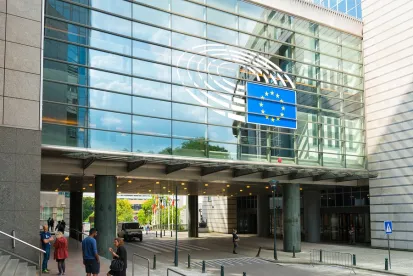ANTITRUST AND COMPETITION
EU Competition Commissioner Vestager Will Also Be Responsible For Coordinating The EU Digital Agenda
Last month, Margrethe Vestager was confirmed as Competition Commissioner for the next five years. In addition, she has been given the role of Executive Vice-President of the Commission, responsible for coordinating the overall digital agenda for the EU.
Vestager’s additional role clearly indicates that the Commission’s enforcement will increasingly focus on digital markets. This is in line with the approach taken so far by Vestager, whose previous mandate has been marked by a number of high-profile investigations against big tech companies. Over the past five years, a major search engine company has been fined three times by the Commission, most recently in March 2019, for alleged abusive practices in online advertising. In December 2019, the Commission opened a preliminary investigation into the way two major tech companies are gathering, processing, using, and monetizing users’ data, including for advertising purposes. The Commission also is investigating whether a major online platform has misused sensitive data from independent retailers who sell on its marketplace in breach of EU competition rules.
Vestager will also have a broader set of tools allowing her to tackle issues in the digital sector on different fronts. Notably, she will be in charge of coordinating Europe’s position on digital taxation.
The choice to entrust Vestager with the responsibility for coordinating the EU digital agenda indicates that there will be a closer relationship between competition enforcement and regulatory policy in the digital sector, notably with respect to platforms. Regarding platforms activities, Vestager recently indicated “how we will handle that, we have not started formulating yet. But that is on our working schedule.”
Whilst large tech companies’ behavior will remain under close scrutiny, the current EU competition rules are likely to be refined and adapted to the challenges of the digital era. Indeed, the Commission’s Mission Letter to Vestager states that she “will evaluate and review Europe’s competition rules” as well as “consider using the tool of sector inquiries into new and emerging markets that are shaping our economy and society.” Digitalization is likely to be a focus, as Vestager indicated last December the need to keep “the rulebook up to date” with respect to digital markets.
United Kingdom’s Competition Authority Publishes Interim Digital Report
On December 18, 2019, the UK Competition and Markets Authority (“CMA”) published an update (“Interim Report“) of its examination of online platforms and digital advertising.
Building up on the findings of the so-called Furman’s report, the CMA especially expressed a concern that certain digital platforms have grown so large and have such extensive access to data that potential rivals can no longer compete on equal terms. Based on its findings, the CMA concluded in the Interim Report that there is a strong argument for the development of a new regulatory regime. Such regime could focus on changing the behavior of online platforms via an enforceable code of conduct for platforms with strategic market status. Platforms with such strategic market status should thus be subject to three overarching principles: fair trading, open choices, and trust and transparency.
The fair trading principle would require the platform to trade on fair and reasonable terms for services where they are an unavoidable trading partner because of their market position.
The open choices principle would require the platform to allow users to choose freely between elements of the platform’s services and those offered by competitors, thus introducing interoperability.
Finally, the trust and transparency principle would aim to ensure that platforms provide sufficient information to users, including both consumers and businesses that transact with the platform.
Moreover, the Interim Report also envisages specific interventions aimed to address the sources of market power as well as barriers to entry and expansion. These interventions include data access and interoperability remedies, measures to give consumers greater control over their data, enabling switching and multi-homing, and separation remedies.
The CMA is currently consulting on the Interim Report ahead of publishing its final version by July 2, 2020. The CMA welcomes stakeholders’ input by February 12, 2020.
At this stage, the CMA is expecting that the most likely outcome of the process will be recommendations to the UK government on how to regulate the digital sector. In the meantime, the CMA expressed its continued readiness to intervene directly with its own powers if potentially problematic issues are not addressed, whether domestically or internationally.
ECONOMIC AND FINANCIAL AFFAIRS
IOSCO Launches Framework For Monitoring Leverage In Funds
On December 13, 201, the International Organization of Securities Commissions (“IOSCO”) issued a report outlining recommendations on a two-step framework assessing leverage in investment funds. The initiative is a follow up to a Financial Stability Board Recommendation requesting from IOSCO to develop consistent measures of leverage in funds to facilitate more meaningful monitoring of leverage for financial stability purposes.
The framework proposed by IOSCO aims at achieving a balance between precise leverage measures and simple robust metrics that can be applied to the wide range of funds offered in different jurisdictions. The framework enhances proportionality taking into account that not all funds threaten financial stability due to their regulatory and legal characteristics.
In the first step, the framework addresses how regulators identify the funds that could pose financial stability risks through using Gross Notional Exposure or adjusted Gross Notional Exposure. In this context, IOSCO characterizes these metrics as baseline analytical tools, underlying their susceptibility to overstate a fund's exposure and not excluding funds that are unlikely to yield financial stability risks. In the second step, a risk-based analysis of the funds identified in the first step will be performed, giving regulators the leeway to determine their approach towards conducting the funds’ risk assessment.To this respect, IOSCO puts forward a set of risk factors—counterparty, market, liquidity—to be considered by regulators in their risk analysis.
In this context, IOSCO, based on the data available by regulators pursuant to its recommendations, will publish an annual report reflecting leverage trends within the asset management industry at a global level. The first report is scheduled for release in 2021.
CONSUMER PROTECTION
Booking.Com Commits To Align Practices Presenting Offers And Prices With EU Law
Following a dialogue with the European Commission and national consumer protection authorities, Booking.com has made a number of commitments to change the way they present offers, discounts and prices to consumers, in order to align with the requirements of EU consumer law.
By June 16, 2020, Booking.com will make several changes in their practices designed to increase the platform’s transparency towards consumers. The changes mainly concern the way that information will be displayed on the platform. The objectives are to clarify the expiry of available offers, the ranking of results and the criteria for price comparison. The changes shall also involve displaying the total price that the consumer will have to pay, including all fees and taxes that can be reasonably calculated in advance, as well as whether an accommodation is offered by a private or a professional host.
In terms of next steps, the competent national authorities will review the implementation of these commitments, independently of any other assessment of compliance with consumer law principles that could be raised in the context of national proceedings. Under the supervision of the European Commission, the national authorities will continue to assess other major online travel services platforms practices.
This procedure results from the collaboration between enforcement authorities under the current Consumer Protection Cooperation Regulation (“CPC Regulation”). Importantly, a new CPC Regulation will be applicable as of January 17, 2020, under which national authorities of the European Economic Area countries (EU Member States, Iceland, Liechtenstein, and Norway) are expected to further extend their cooperation to jointly address consumer law infringements in the internal market. The new CPC Regulation will allow national authorities to tackle new areas such as short duration infringements or misleading advertising campaigns. Its purpose is also to strengthen competences of national authorities in order to ease cross-border cooperation and deal with bad online practices more efficiently.
INSTITUTIONAL AFFAIRS
The Croatian Presidency Of The EU Outlines Its Priorities
From January 1 to June 30, 2020, Croatia will preside over the Council of the EU for the first time since it joined the EU in 2013. During this six-month period, Croatia will set the agenda of the Council and lead the work of the institution that, together with the European Parliament, adopts EU law. The challenges the new Presidency is called to face include in particular Brexit and the negotiations on the Multiannual Financial Framework 2021 - 2027, which Croatia intends to advance. Croatia, taking over from the Finnish Presidency, will work around four main sets of priorities, which it has defined as “a Europe that develops, a Europe that connects, a Europe that protects and an influential Europe”.
A Europe That Develops
Under this broad goal, the Croatian Presidency aims to boost a balanced regional development by reducing economic disparities among Member States, reinforcing the Economic and Monetary Union and ensuring a uniform quality of products throughout the single market. To achieve these objectives, a number of legislative proposals may feature in the coming months, in particular: the Directive on credit servicers, credit purchasers and the recovery of collateral; the Regulation on the EU Sovereign Bond-backed Securities and the Regulation to establish a European Deposit Insurance Scheme.
In line with the European Commission’s priorities, the Croatian Presidency intends to improve environmental protection and fight climate change by advancing discussions on a green Europe and, through the implementation of the Paris Agreement, help transition to a low carbon and circular economy. To do so, the proposals on a Regulation on the framework to facilitate sustainable investment, a Regulation establishing a programme for the environment and climate action and a Regulation on minimum requirements for water reuse are the prominent pieces of legislation that the Presidency plans to push through the legislative machinery.
Furthermore, the Croatian Presidency plans to strengthen the competitiveness of European industry, including small and medium enterprises, deepen the single market and promote the digitalization of business. To this end, the following pending proposals could be negotiated: the Regulation to establish a Programme for single market competitiveness of enterprises, including SMEs and European statistics 2021-2027; the Regulation establishing Horizon Europe - the Framework programme for research and innovation 2021-2027; and the Regulation establishing the Digital Europe Programme 2021-2027.
A Europe That Connects
With the aim of further developing a networked economy and exploiting its full potential, Croatia proposes to boost a Single European Transport Area through dedicated funds for the construction of infrastructure networks and the innovation and digitalization of all branches of the transport sector. The following proposals fall under this remit: the Directive on the charging of heavy goods vehicles for the use of certain infrastructures; the Directive on the use of vehicles hired without drivers for the carriage of goods by road; and the Directive on the establishment of common rules for certain types of combined transport of goods between Member States.
Moreover, Croatia announced it will focus on the improvement of the quality and security of data infrastructure by creating the conditions for the full deployment of 5G networks, and expressed its intention to deepen the integration of the energy market by fostering the Energy Union.
A Europe That Protects
To ensure the security of EU citizens, Croatia plans to improve the effectiveness of controls over external borders, enhance the interoperability of IT systems in the area of justice and home aff¬airs, and strengthen resilience against malicious cyber activities. Some of the proposals relevant to achieve these objectives are the Regulation on preventing the dissemination of terrorist content online; the Regulation concerning the respect for private life and the protection of personal data in electronic communications; and the Regulation on establishing the Internal Security Fund.
An Influential Europe
Finally, to face global challenges, the new Presidency promotes the vision of a “leading role for the EU on a global scale”. However, it does not specify which measures it intends to adopt to achieve such an objective, besides strengthening multilateralism, cooperation with third countries and promoting enlargement as well as neighbourhood policy, especially with the Western Balkans.
INTERNATIONAL TRADE, CUSTOMS, AND EXTERNAL RELATIONS
Europe Proposes Aggressive Action Amid WTO Tensions
Against a backdrop of heightened global tensions over international trade, the European Commission unveiled a proposal for a regulation that would allow the EU to protect its trade interests despite the paralysis of the WTO’s Appellate Body, which stopped functioning on December 10 due to the American veto on new appointments of judges. The proposal aims at amending the existing Regulation (EU) 654/2014 on the enforcement of international trade rules, most commonly referred as the Enforcement Regulation (“Regulation”). The Regulation currently serves as a legal basis for the EU to (1) adopt trade countermeasures when its trading partners do not fulfill their obligations under WTO treaties and (2) set the condition that a trade dispute proceed all the way through the WTO dispute resolution system before the EU can act in retaliation.
Given the current paralysis of the WTO Appellate Body, the Commission’s proposal, if adopted, will allow the EU to act even if a dispute has not gone through the entire dispute resolution procedure and even though the WTO has not delivered a final ruling on a dispute. This change will prevent trading partners from blocking European countermeasures by simply filing an appeal to the WTO Appellate Body. This does not mean that the EU is turning its back on the multilateral trading system, as the proposal still requires the EU to wait for the dispute to go through a first-instance panel, which means the EU will still be bound by first-instance WTO rulings.
The Commission has specified that the change would also apply to dispute settlement provisions in bilateral or regional trade agreements to ensure that the block is not toothless when a trading partner hinders the effective settlement of a dispute. In line with this reform, the new Commission has created the position of “Chief Trade Enforcement Officer” within its Directorate-General for Trade. The new trade enforcement boss will be dedicated to the monitoring and effective enforcement of the numerous trade agreements the EU has concluded in recent years. The position is expected to be filled early this year.






 />i
/>i

